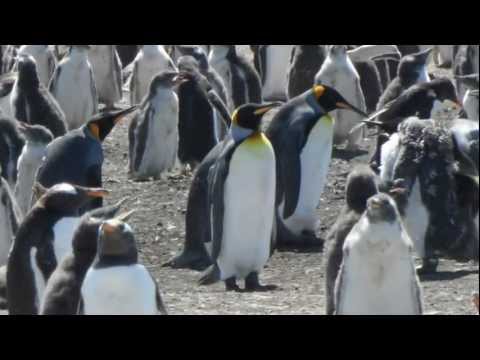
A visit to the Falkland Islands is a must for wildlife enthusiasts, especially those enchanted by penguins. Located in the Southern Atlantic Ocean, these remote islands offer a unique ecosystem where various species of penguins live side by side. For travelers embarking on an Antarctica cruise, a stopover at this archipelago introduces them to a fascinating world where wildlife rules and humans are mere visitors.
### The Penguins of the Falkland Islands
The Falkland Islands serve as one of the most important breeding sites for several species of penguins. The archipelago’s rugged terrain, sandy beaches, and pristine waters make it an ideal habitat for these birds. Among the types you can expect to see during your visit are:
1. **King Penguins**: Known for their striking appearance and large size, King Penguins are the second largest penguin species. They can often be spotted on several beaches across the islands, standing out with their bright orange ear patches.
2. **Gentoo Penguins**: Easily recognized by their bright red-orange beaks and white feather caps, Gentoos are the fastest underwater swimming penguins, reaching speeds up to 36 km/h (22 mph). They mainly populate grassy areas where they nest in large colonies.
3. **Magellanic Penguins**: Named after the explorer Ferdinand Magellan who first sighted them in 1520, these medium-sized penguins dig burrows or nest under bushes to protect themselves from predators and harsh weather.
4. **Rockhopper Penguins**: Famous for their distinctive yellow and black plumes and red eyes, Rockhoppers live up to their name by leaping across rocks with surprising agility. Their colonies are usually found on rocky coastlines.
Each species has adapted uniquely to thrive in the challenging conditions of the Falklands’ climate and landscape.
### The Penguin Watching Experience
Visiting these charismatic creatures in their natural habitats offers a rare glimpse into the lives of one of Earth’s most endearing birds. Tour operators on Antarctica cruises ensure that excursions to penguin colonies are conducted with utmost respect towards wildlife conservation standards. Guidelines limit proximity to animals to avoid distressing them, ensuring that observation is done at a safe distance.
Photography enthusiasts will find no shortage of incredible photo opportunities as they capture candid moments of penguin life: from nurturing chicks and socializing within groups to majestic solo poses against dramatic landscapes.
### Integrating into your Antarctica Cruise Itinerary
Most cruises heading southward towards Antarctica include a stop in the Falkland Islands before crossing the infamous Drake Passage. This itinerary allows passengers not only to discover diverse marine life but also enjoy birdwatching—highlighted by encounters with numerous seabirds aside from just penguins.
### Conservation Efforts
The allure of witnessing penguins in their natural setting comes with a responsibility toward conservation efforts. Increased human activity poses threats like habitat destruction and oil spills which can affect local wildlife drastically.
Organizations like Falklands Conservation work continuously towards protecting these lands through research projects and habitat restoration initiatives ensuring that penguins continue thriving here for generations to come.
### Conclusion
A journey to the Antarctic realm is incomplete without witnessing its most beloved inhabitants—penguins—in one of their most thriving habitats: The Falkland Islands. Whether you’re an avid birdwatcher or just looking for a unique encounter with nature at its purest form, this destination offers an unparalleled opportunity to observe various penguin species up close while gaining insights into their intriguing lives—all from respectful distances managed responsibly by seasoned Antarctic cruise operators.
Embarking on such an expedition not only satiates your wanderlust but also contributes indirectly toward important ecological preservation efforts making every visit worthwhile both emotionally and environmentally.
